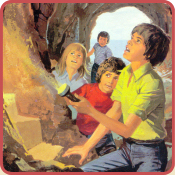
The Enid Blyton Nature Readers (No. 6)

Book Details...
First edition: 1945
Publisher: Macmillan
Illustrator: Eileen A. Soper
Category: The Enid Blyton Nature Readers
Genre: Nature
Type: Readers
Publisher: Macmillan
Illustrator: Eileen A. Soper
Category: The Enid Blyton Nature Readers
Genre: Nature
Type: Readers
On This Page...
- The Clever Weather Cock
Story: Specially Written - The Very Queer Chicks
Story: Specially Written
Nature plates, illustrated by Eileen A. Soper


The Clever Weather-Cock

There exists a rooster who is able to foretell the weather, which is quite a useful attribute and often used by the other farm animals. For instance the ducks might be told that it's going to rain through the night, which means that next day they'll be able to enjoy themselves splashing through the puddles left behind. Another time the hens might be advised to stay snug in their houses because icy-cold weather is due and, sure enough, there'd be a fall of snow overnight. One of the ducks is intrigued by the rooster's talent and asks him how he does it, to which he replies,
"The wind tells me."
He explains that if it blows from the north, there'll be cold weather ... the reason being that it passes over icy-cold lands before arriving here, and when the duck asks him why some winds bring rain the rooster's answer is that it passes over the sea and becomes wet. The duck thinks he's quite a brilliant fellow.
"What wind is blowing now?" she asks.
"It's warm and wet coming from the west and south - a south-westerly wind in other words," says the rooster and once again that sounds pretty good but he isn't the only weather forecasting bird in these parts. Another one happens to be sitting at the top of a nearby church. It is of course known as a 'weather-cock' and able to indicate atmospheric conditions by swinging around in the wind amidst compass points.
One day a tremendous gale swells up causing a good deal of damage. It springs from the north-west and the old rusty weather cock up on the church creaks round and round until it's blown right off of the spire. It shoots high into the air over the trees and down into the farmyard pond, scaring the ducks no end. They rush off to the rooster whom they're sure will be able to explain what has happened.
Yes, he knows all right.
"It's the weather-cock from the church steeple of course; obviously the wind blew him off his perch. Good afternoon, weather-cock."
Back comes a gurgling "Booble, booble, booble, booble!" from the pond which could be reasonably translated as,
"Good afternoon."
But now a problem has arisen and the hens voice their concern.
"There's no weather-cock on the church spire. No one will know which way the wind is blowing and the children will be very upset."
However there's a solution is there not and one doesn't need to possess a very high IQ to determine what happens next. Suffice to say, the following seven (no less) pages contain information for Enid Blyton's eager-to-learn readers about such things as dandelion seeds, thistledown clocks and other wind-associated paraphernalia.
The Very Queer Chicks
In this tale a farmyard hen wants to raise a family and she must have expressed her desire in some way to the farmer's wife because that woman decides to give the bird some duck eggs to hatch out. Miss Blyton has told us many times that ducks make rather bad mothers, so one dozen eggs of the duck variety are placed in a nest of straw for the clucky hen. She and her nearby friend, a white chook who's sitting on some ordinary eggs, are very happy and no doubt both looking forward to their coming families.
They tend to their clutches for a few weeks and then the white hen hears a tapping sound on one of her eggs and next day she's the proud mother of twelve. Very soon the other hen is also rewarded with a brood of what she thinks are chicks and very pleased she is with them all. One of the first things she does is to instruct them that when she yells out "CLUCK-CLUCK" they must run back at once and hide under her wings.
Things seem to be working out all right and when the cat is seen prowling around, the hens give loud "CLUCK-CLUCKS," to which their youngsters respond immediately by running to safety. The chicks are taught how to scratch about the ground to see if any seeds are buried nearby and, all-in-all, life is blissful for the hens and their families, the ducks, the old sow grunting in her sty, and the cows that frequent the milking shed.
The ducklings grow fast and then one of them discovers the pond when he happens to follow behind the older ducks one day. Well, what excitement this causes. He calls the other chicks and ducklings down to see the expanse of water but the chicken side of the hens' families aren't impressed at all.
"Just water. So what?" - is the general opinion, but the ducklings take a different view and approach the water's rim whereupon their mother rushes down clucking loudly and chases them away. Unfortunately for the hen she's on a losing wicket because the ducklings keep thinking about the pond and discussing it with each other then one morning after some showers their mother's ire is raised once again when she spots her ducklings splashing around in a large puddle. She tells them off and reminds the brood that chicks never get wet if they can help it, but the ducklings have now got the bug and when their puddle dries up they think of that inviting pond over the way.
They want to paddle in it and get their feet wet so they waddle down and stand at the water's edge causing their poor mother to dash over in a reprimanding mood, but this time the ducklings ignore her. One by one they jump in and there they are swimming beautifully with mother hen running back and forth squawking so loudly that the farmer's wife comes out to see what's going on. She understands what's happened of course and takes time to inform the hen what kind of birds her babies really are, and she even calls a duck over to demonstrate an example of webbed feet. She explains that ducks have them for swimming whereas hens have strong feet for scratching around in the yard.
By some means the hen takes this in and she's also told how ducks' beaks differ from her own so this plot-less story ends with an educated bird who, according to the farmer's wife, should not have scolded the little ducklings.
"It is I you should scold, for it was I who gave you duck eggs to sit on, instead of hen's eggs!"
#2: Several times, Enid Blyton has reported on the consternation that ducklings cause their foster mothers but although she often repeats herself, our interest needn't wane because the characters and settings are different.
"Well, ducks aren't very good mothers," said Fanny. (Children of Willow Farm)
The mother hen went nearly mad with worry, she rushed about beside the pond, clucking and calling, whilst the other hen with her chicks stood looking on in horror. (Children of Willow Farm)
They ran straight to it, and paddled in the edge of the water, cheeping loudly. The mother-hen ran after them, squawking at the top of her voice. (Shadow the Sheep-Dog)
Plenty of Eileen Soper hen and duck pictures in this booklet.








